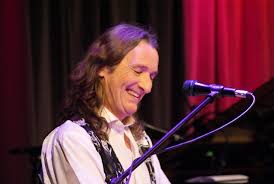Hodgson in Milwaukee
 Prior to his performance on Saturday night at the Northern Lights Theater in Milwaukee, I hadn’t seen Roger Hodgson grace the stage since his final tour with Supertramp in 1983, and it was hard to believe the same man could belt out the same tunes as forcefully as he had three decades ago. Sporting a white shirt and black vest, Hodgson alternated between keyboards and acoustic guitar, backed up by a four-piece band and a largely superfluous 17-piece orchestra.
Prior to his performance on Saturday night at the Northern Lights Theater in Milwaukee, I hadn’t seen Roger Hodgson grace the stage since his final tour with Supertramp in 1983, and it was hard to believe the same man could belt out the same tunes as forcefully as he had three decades ago. Sporting a white shirt and black vest, Hodgson alternated between keyboards and acoustic guitar, backed up by a four-piece band and a largely superfluous 17-piece orchestra.
Beginning with “Take the Long Way Home,” Hodgson stuck largely to his Supertramp repertoire, performing each of his songs from 1974’s breakout album Crime of the Century and the mega-hit Breakfast in America, along with several from the intervening albums. Particularly surprising were the inclusions of “Easy Does It” and “The Two of Us” from 1975’s Crisis? What Crisis? Notable absences on this particular evening were songs he performed on other nights of his four-night run in Milwaukee: “A Soapbox Opera” and “Even In the Quietest Moments.” That he mostly ignored his solo career was a little disappointing, as I would have loved to have heard “Had a Dream” and “In Jeopardy” from his debut solo album, and I wish the Supertramp song “Crazy” would have been part of the setlist. Also oddly absent from the evening was electric guitar. Hodgson is a master at the tasteful solo or well-placed wail – placing him in the same category as David Gilmore – but these parts were instead arranged for the orchestra, whose presence was most appreciated on “Fool’s Overture,” Hodgson’s epic composition from 1977, and “Hide in Your Shell” from Crime of the Century.
Roger seemed genuinely pleased at both being able to perform his old material at such a high level and by the audience’s reaction. Supertramp made their North American debut in Milwaukee, and back when radio stations had more leeway to support particular artists, Milwaukee was one of the band’s hubs. Hence the four successive shows at Northern Lights, an intimate theater that allowed Roger to give special dedications and wishes to various members of the audience between songs. When he was with Supertramp, Hodgson and fellow singer/composer Rick Davies yielded audience interaction duties to saxophonist John Helliwell. Now Hodgson takes on these duties himself, and he seems more comfortable in his own skin today than when he was at the height of his career.
Hearing Hodgson’s band faithfully reproduce the parts originally played by Dougie Thomson, Bob Siebenberg, John Helliwell and Rick Davies only made me appreciate how adept the original band was at creating a “sound.” Tastefully understated parts made the whole bigger, and though they may not have been household names, these guys what they were doing. Current woodwind virtuoso Aaron Macdonald blew through recognizable solos from tunes such as “The Logical Song” and “It’s Raining Again,” and it highlighted how innovative and integral John Helliwell’s contributions to the original band were. Drummer Bryan Head played behind a drum shield of Plexiglass, and while this may help with sound separation, it was visually unappealing. More intricate bands have managed happily without one, and I wish sound engineers would employ other techniques to improve their live mixes.
Back in 1979, when Supertramp temporarily ruled the Billboard charts, “Take the Long Way Home” was a favorite of mine, but when I heard Hodgson sing it on Saturday, the following lines hit home harder than they ever had before:
When you look through the years and see what you could have been
Oh, what might have been
If you’d had more time
When I last saw Hodgson in 1983, I was fifteen, and the world’s expanse was limitless, the future so vast, I could hardly contain the very thought of it, my arms unable to open wide enough to embrace what lay ahead. I no longer feel that way. I suspect Roger doesn’t either, but it was cool to see a man happy to revisit the past for an evening and share it with an appreciative audience.